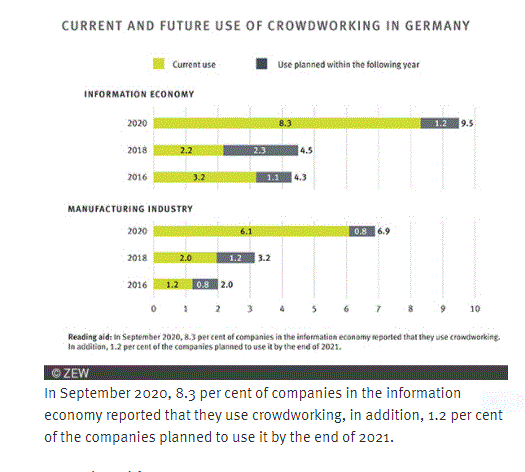En ny outsourcing-bølge er på vej i den tyske og franske industri, og det gælder især i de erhverv, der arbejder med informationer, viser en undersøgelse fra det tyske ZEW-institut. I Tyskland bruges det engelske udtryk crowdworking for denne form for outsourcing, som især omfatter en række interne “software”-funktioner fra bogholderi til design og software-løsninger. 8,3 pct. af virksomhederne i informations-økonomien har outsourcet funktioner, mens det er 6,1 pct. i industrisektoren. Men på sigt kan outsourcingen stige gevaldigt – til en tredjedel af alle virksomheder, der vil outsource. Det vil i så fald også ske for at få fat i flere specialister til midlertidige opgaver i stedet for at hente specialisterne ind i huset. Udviklingen er tilsvarende i Frankrig. ZEW-undersøgelsen blev gennemført i 2020, men pandemien med hjemme-arbejde vil utvivlsomt forstærke den nye outsourcing.
Uddrag fra ZEW:
Companies Increasingly Turn to Crowdworking Platforms
Survey in the Information Economy and Manufacturing Industry
Crowdworking, or crowdsourcing, refers to the use of online platforms to outsource traditionally in-house tasks and projects to external workers, so-called “crowdworkers”. The tasks carried out by these crowdworkers range from less complex activities to the completion of entire projects, e.g. in the field of design or web programming.
In addition to crowdworking, technological progress has also made location-based platform work possible, for example in the form of driving services. Both forms of platform-based employment have attracted increased public attention and political debate in recent years, and are internationally known as gig economy. A company survey conducted by ZEW now provides new insights specifically on the use of crowdworking.
Almost 800 companies from the manufacturing industry and the information economy, which includes the ICT sector, media service providers and knowledge-intensive service providers, took part in the survey carried out in Germany in September 2020.
The representative results clearly show that the use of crowdworking has experienced a significant boost in the sectors studied in Germany. In 2020, 9.5 per cent of companies in the information economy were already using crowdworking or planned to do so by the end of 2021. Compared to the current results, notably fewer companies have used or planned to use crowdworking in the past. In the information economy, this share was 4.3 per cent in 2016 and 4.5 per cent in 2018.
Meanwhile, in manufacturing, this share has risen from 2.0 per cent in 2016 and 3.2 per cent in 2018 to currently 6.9 per cent. For the period from 2018 to 2020, both sectors have thus seen a significant boost in the use of crowdworking. As the most recent survey was conducted in September 2020, part of this increase could also be due to Covid-related adjustments in the work organisation.
Many potential uses for crowdworking
Potential uses for crowdworking via online platforms are manifold; both for companies that already use crowdworking and for those that have not used it so far. For example, about 33 per cent of companies in the information economy and manufacturing could imagine crowdworkers taking over technical tasks, e.g. related to the internet, programming and data analysis, in their company.
Almost as many companies see potential for sourcing out creative tasks via crowdworking platforms, including activities in the areas of graphic design, marketing or copywriting. Almost 20 per cent of companies think that administrative tasks such as accounting, customer service or project management could possibly be taken over by crowdworkers, and around 15 per cent can imagine crowdsourcing supporting data work, such as categorisation and tagging.
Not only do the potential areas of application vary, but also the reasons why companies would use crowdworking. More than 50 per cent of the companies in both sectors mention the acquisition of specialised knowledge as a potential reason for using crowdworking.
According to the field of use, this specialised knowledge could, for example, refer to design knowledge or coding skills. In addition, between 37 per cent (manufacturing) and 46 per cent (information economy) of the companies surveyed would like to achieve more staff flexibility through the use of crowdworking, for example to avoid bottlenecks or to complete projects more quickly. In addition, both the information economy (31 per cent) and manufacturing (41 per cent) would use crowdworking to save costs.
A short time after the survey in Germany, companies in France were also asked about their use of crowdworking. In terms of areas and goals of use, there are many similarities between the companies in both countries. The ZEW expert brief entitled “Crowdworking in France and Germany” describes in detail the similarities and differences in the use of crowdworking by companies in Germany and France.













